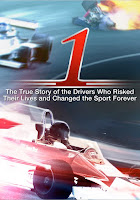A
film review by Martin Liebman for Blu-ray.com on Feb. 18, 2014.
Ready
drivers, revving engines, squealing tires, burning rubber, a harmony of moving
parts, man and machine bound together by a few straps, both moments from glory
and inches from death. 1 shares the
tragic history of Formula One racing, a sport dogged by death and fueled by
passion, innovation, and a need to test the limits of man and mechanical
endurance. It's the story of the men who build the cars, the men who drive the
cars, the violent deaths many suffered, and the progress in safety into the
modern era. It's a straightforward and oftentimes blunt history of man's
fascination with moving fast and building a better product that can propel him
faster and further than others, but at the risk of an untimely demise and for
the satisfaction of doing something better than anyone else. The film, directed
by Paul Crowder (The Last Play at Shea), written by Mark Monroe (The Tillman Story), and narrated by Michael Fassbender (X-Men:
First Class), paints a vivid and captivating picture of the juxtaposition
between sport and tragedy, desire and mortality, and life and death.
1 covers several
decades of Formula One triumph and tragedy, a large roster of rising talent and
fallen stars, and a detailed examination of car improvements, failures, and
improved safety measures over that time span. The film opens with a study of
Formula One's formative years and its first premiere driver, Juan Manuel Fangio, who dominated the
sport throughout the 1950s and held a world-record five titles, a total that
would not be surpassed for more than forty years. The picture examines the
thrills and dangers of racing, focusing on car development and increased speeds
which yielded an increased number of fatalities. The picture focuses on a
number of drivers over the years and their place in the sport's triumphs and
tragedies, including Jim Clark, Graham Hill, Lorenzo Bandini, Jochen
Rindt, Jackie Stewart, Roger Williamson and François Cevert. The film focuses
heavily on the Niki Lauda - James Hunt rivalry, Lauda's accident
and quick return to the sport, and his refusal to finish the 1976 Japanese
Grand Prix, citing track safety concerns, a pivotal moment in racing's history
and engendering a new push for driver safety. The film follows through to the
modern day and the death of Ayrton Senna,
the sport's last casualty as of 2012.
1 builds the story of
Formula One through the prism of its tragedies and the drivers who befell them.
Through driver profiles, interviews with their peers, and vintage footage, the
picture assembles a troubling history that speeds towards a more stable
present. While it's a relevant approach, it grows difficult to watch in quick
order. Even for those unfamiliar with the sport, it becomes clear early on that
almost each driver who is a focus will perish in an accident. It's an overload
of tragedy, but then again, that's the point. Formula One's history is one of
innovation and the daredevils who perished because of those innovations. The
film's feeling of despair and hopelessness accentuates that history and drives
home the point with relentless and unforgiving bluntness, saved only by the
sport's transition to safety-first protocols in the later years and a brief
depiction of the joys of competing and winning in as much safety as the sport
allows.
The
film's rapid-fire depiction of the horrific rate at which drivers died is
balanced by a fascinating story of automobile evolution and the greater push
towards improved safety measures, measures that were initially road-blocked by
money and politics but that were eventually embraced with Formula One's
emergence as a force on television and Niki Lauda's injury and refusal to race
in unsafe conditions that propelled the sport to better, more advanced
safety-first measures that are now a staple of the sport, a sport that's become
one of the safest in the auto racing world. The film is smartly assembled in,
for the most part, chronological order. It's well-versed and accessible,
foregoing an overload of tech terminology in favor of a more audience-friendly,
almost casual approach. It will certainly speak more to viewers who are
intimately familiar with Formula One and its history, but newcomers or casual
race watchers shouldn't be put off by anything in the film. [Liebman’s rating:
*** ½ out of 5 stars]
Blogger’s
comment: While I enjoyed this documentary, my favorite film on the subject of
Formula One racing remains the Ron Howard film Rush, with Chris Hemsworth in the role of British racer James Hunt
and Daniel Brühl in the role of Austrian racer Niki Lauda. I would treat
documentaries like 1 and Ferrari: Race to Immortality as
complementary and supplementary.
Labels: action, auto-racing, documentary, Ferrari, history, sport, tragedy

No comments:
Post a Comment